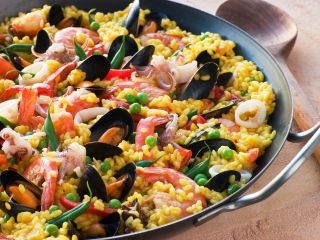Diet
Welcome to the Modern Mediterranean Diet
Gluten-free. Low-glycemic. Anti-inflammatory. Delicious!
Posted April 2, 2014

How would you like to eat fats and carbohydrates and still lose weight? Enjoy delicious dishes that are easy to prepare? Eat foods that lower your risk of disease and help you live longer?
Do you like the sound of a diet that’s gluten-free but includes delicious baked goods? That’s heavily plant-based but still lets you eat meat, fish, eggs and dairy, and encourages the occasional glass of wine?
“Dream on!” you’re saying? Not at all, this diet really exists. It’s called the Modern Mediterranean Diet.
Skeptics take note: this is no fad diet, and there's no need to buy expensive supplements, protein powders or kitchen machinery. All you need to do is obtain fresh, seasonal ingredients and turn these into delicious, simple, healthy dishes.
This way of eating isn’t new; it’s been practiced for thousands of years around the Mediterranean Sea, which is lined by 21 countries including Italy, France, Spain, Greece, Morocco, Israel and Lebanon.
The Mediterranean Diet has stood the test of time: Until processed food started making inroads into the region after World War II, this way of eating barely changed over 5,000 years.
It has also stood the test of science: in contrast with the shaky evidence upon which most currently fashionable diets rest (e.g. vegan, paleo, raw, ketogenic, extreme low-fat, etc.), the Mediterranean Diet boasts a proud scientific pedigree.
Numerous studies have shown that this way of eating lowers blood pressure, helps with weight control, regulates cholesterol and cuts the risk of diabetes, cancer and Alzheimer’s disease. It’s also been found to reduce asthma in children, boost fertility and reduce the incidence of birth defects.
What’s the “magic ingredient” that makes the Mediterranean Diet so healthy? There’s no single factor; rather, it’s the very combination of a wide variety of natural foods – vegetables and fruits, healthy fats, clean fish, meats and eggs, nuts and beans, whole grains, herbs and spices – that nourish our bodies optimally in ways that man-made supplements have not yet been able to mimic.
Why “Modern”?
I have taken the traditional Mediterranean Diet a few steps further, adapting it to modern lifestyles and thus creating what I call the “Modern Mediterranean Diet.”
First, I have removed gluten – a compound many people don’t tolerate and that isn’t necessary for human health. The Modern Mediterranean Diet allows you to enjoy Mediterranean baked goods such as pizza, focaccia, cakes and cookies that are gluten-free and more nutritious than the originals they are based on.
For example, I use flax seeds, almonds, eggs, garlic, herbs and olive oil to make pizza dough that’s delicious, super-quick to prepare and much more nutritious than traditional pizza. (This recipe, and others like it, has been featured in Modern Mediterranean Meal Plans. You can download a free sample meal plan here.)
Next, the Modern Mediterranean Diet emphasizes carbohydrates that don’t push blood-sugar levels sharply higher. This is not only vital for people with diabetes or pre-diabetes, but also for anyone seeking to shed weight, prevent heart disease, dementia and certain types of cancer.
Thus, Modern Mediterranean risottos are made with basmati rice or, if you tolerate gluten, with barley, both of which have a considerably lower impact on blood-sugar levels than the traditional Arborio rice. Cakes and cookies are made with ground nuts, honey and healthy fats, and we use sweet potatoes in place of white potatoes, or quinoa in the place of couscous – all of which have a low or moderate impact on blood-sugar levels. What’s more, the Modern Mediterranean Diet shows you how to balance carbohydrates with proteins and healthy fats so your meals don’t send your blood-sugar levels soaring.
Finally, what makes this approach “modern” is that it uses new ingredients and techniques not known to Mediterranean cooks of old.
Innovative ingredients might include flax or chia seeds, green tea, ginger, stevia, sauerkraut or seaweed.While not being "typically Mediterranean" they have proven health benefits and fit logically into the Mediterranean-diet framework.
And where our ancestors had to grow their own food or buy it at a weekly market, modern retail systems – supermarkets, food-delivery services and online stores – make it easier than ever before to obtain Mediterranean ingredients such as olive oil, olives, saffron and sundried tomatoes. (Not that I don’t love farmers’ markets – I do! – but many of us don’t have the time to visit them regularly.)
Modern appliances, meanwhile, can take the hard work out of traditional food preparation. Thus we can use an electric food processor, rather than mortar and pestle, to make a batch of fresh pesto in a matter of seconds; an electric mixer instead of a wooden spoon to whip up olive oil mayonnaise; and a freezer to preserve our favorite produce so that we can still enjoy it when it’s not in season. All this makes it possible even for time-starved people to enjoy the Modern Mediterranean Diet.
Nourishing body and soul
The many antioxidant, anti-inflammatory, blood-sugar-regulating, immune-boosting, hormone-balancing, blood-fat regulating foods that make up the Mediterranean Diet are one reason for its healthfulness.
But there’s another reason why this way of eating is so healthy: its emphasis on the guilt-free enjoyment of simple, delicious foods – ideally in the company of people others.
I have written about this in my book, Zest for Life: The Mediterranean Anti-Cancer Diet, and also in this blog: allowing ourselves the time and mental space to obtain, prepare and savor natural, fresh foods, simply prepared is one of the most relaxing, life-affirming pleasures we can give ourselves and others. Slowing down to enjoy our food -- a widespread practice in the Mediterranean region -- not only nourishes our body, but also our soul.
Moreover, because the Mediterranean Diet doesn’t forbid specific foods, you don’t have to obsess over “right” and “wrong.” This in turn helps to lower your “healthy-eating stress levels,” a common affliction among health-conscious folk. As long as you eat a varied diet of nutrient-dense, fresh food 80% of the time, occasional slips in the remaining 20% -- for instance, a cookie after lunch or a handful of potato chips at a picnic – are okay.
Because the Mediterranean Diet is delicious and satisfying, you won’t experience the sense of deprivation and cravings many other diets bring. And because the food is simple to prepare – there are no complicated techniques to master, nor expensive equipment to buy – it’s accessible even to people with limited time, little cooking experience and tiny kitchens.
All this makes the Modern Mediterranean Diet easier to adopt and maintain long-term, unlike many time-limited “diets.”
In my next post I’ll tell you about the 10 key features of the Modern Mediterranean Diet – and easy ways to integrate it into your life!
(c) Conner Middelmann-Whitney. Conner is a nutrition coach and cookbook writer specializing in the Mediterranean diet. She is the author of Zest for Life: The Mediterranean Anti-Cancer Diet and Modern Mediterranean: Christmas and New Year. Conner offers Mediterranean diet coaching (online and in-person) and publishes Modern Mediterranean Meal Plans, a recipe and meal-planning service for busy people wishing to "Mediterraneanize" their diets. For more information about her work, please visit her website, www.modernmediterranean.com.




